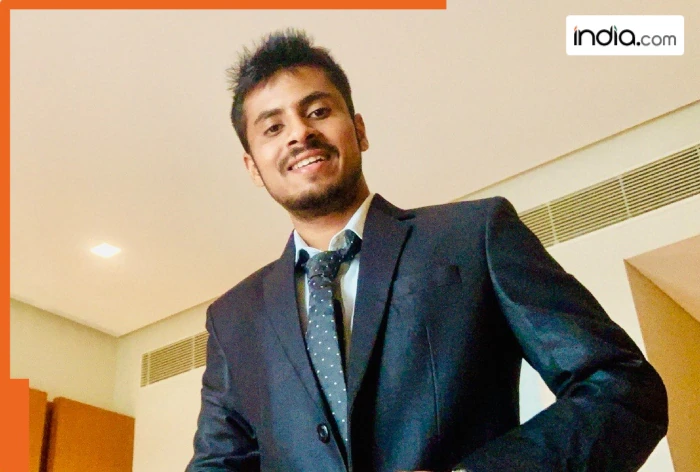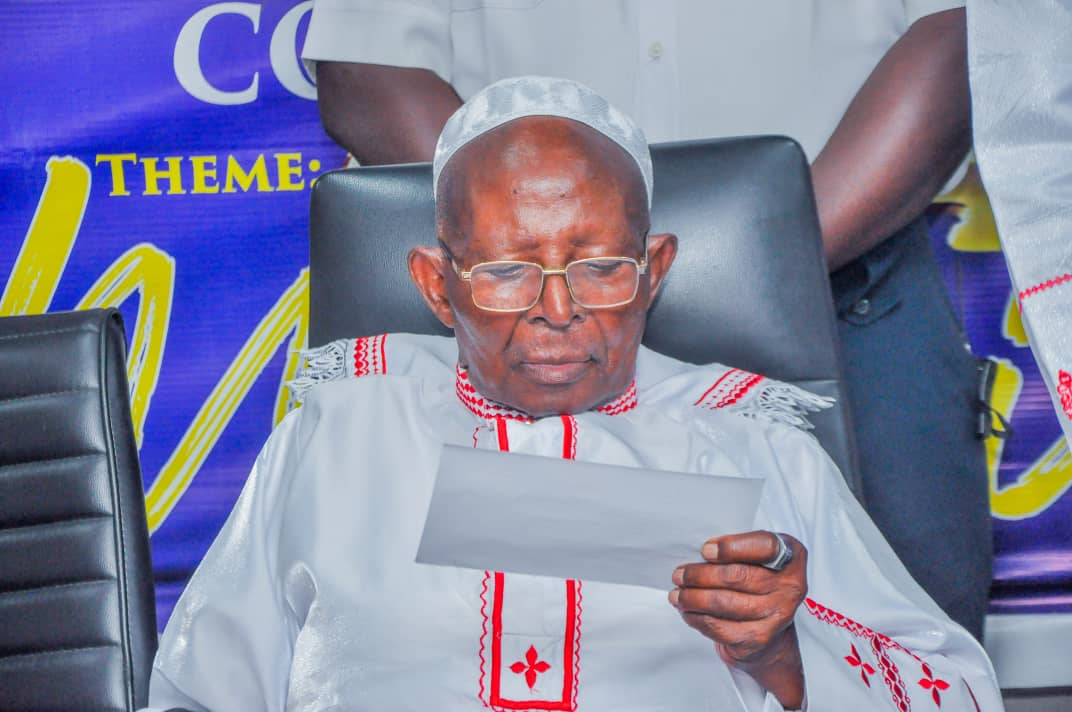Copyright thenationonlineng

By Kayode Egbetokun Let me speak first as a citizen before I speak as the Inspector-General of Police. I am deeply concerned about the moral and mental state of our country. This gathering is not just another academic conference; it is an awakening. It calls our minds to think differently, listen deeply, and act wisely. I look around and see the officers who protect and the lecturers who teach are in this hall. The elders who advise and the youths who will inherit tomorrow are also here. Seated among us are our revered traditional rulers; custodians of wisdom, culture, and community harmony; whose moral authority still commands peace where the law sometimes cannot reach. The journalists, chroniclers of truth, whose pens and voices help shape national perception and hold power accountable. And let us not forget the entrepreneurs and business leaders who drive our economy, the artisans and traders whose hands sustain daily life, the clergy who guide our moral compass, and every citizen whose choices shape our collective destiny. Together, we all have a part to play in building the Nigeria we desire, a nation secured not by force alone, but by the united will of its people. The truth is that a nation’s first line of defence is not its army; it is its people; educated, disciplined, and united by the rule of law. A belief is formed long before a shot is fired. A notion comes before a bomb is made. Truth is surrendered before peace is broken. That is why gatherings like this matter. They speak not only to the noise of our times but to the conscience of our country. By hosting this summit, LASUED has shown rare vision. You have reminded us that universities are not just repositories of knowledge; they are refineries of the national conscience. So, we are not only here to discuss the police; we are here to discuss peace itself. For safety is not merely the absence of crime; it is the presence of justice, knowledge, and trust. Insecurity is not just a policing problem; it is a societal one, rooted in the failure of values, education, and civic discipline. When ideals crumble, ignorance rises. When people stop trusting, fear spreads. That is why the dialogue between the town and the gown is not ceremonial; it is existential. The patrol van and the classroom are fighting the same war: one battles ignorance, the other its consequences. One opens the mind; the other protects what the mind has built. When the teacher and the officer walk together, crime loses shelter. When ideas and enforcement work together, peace begins to take shape. As we deliberate today, let us remember this truth: Nigeria’s future will not be secured by guns, but by brains and moral discipline. SECURING NIGERIA THROUGH THE TOWN–GOWN PARTNERSHIP The Town–Gown Partnership must no longer be viewed as a conversation between the Police and the universities alone. It must evolve into a national doctrine of collaboration; a model that binds every sector of our society together under a shared mission of peace, progress, and prosperity. The “town” represents the vibrant energy of our people, the markets, the media, the palaces, the mosques, the churches, the workshops, the farms, the boardrooms, and the communities that pulse with the daily rhythm of Nigeria. The “gown” represents the knowledge powerhouses, our universities, research centres, think tanks, and professional institutions that create ideas, technologies, and policies to shape the future. When these two realms merge; the practical wisdom of the town and the intellectual capital of the gown, a nation moves from reaction to prediction, from survival to innovation, from suspicion to synergy. This partnership must therefore extend to every sphere of national life: • Between government and academia, to design policies rooted in evidence and measurable impact. • Between security agencies and communities, to transform policing from enforcement to partnership. • Between business and education, to turn research into enterprise and create jobs for our youth. • Between religious institutions and civic leaders, to rebuild moral capital and social discipline. • Between media professionals and educators, to promote truth, tolerance, and national cohesion. • Between traditional institutions and modern governance, to blend wisdom with law and heritage with innovation. No nation develops in isolation. The mind of the university must engage with the realities of the street; the hands that build must learn from the heads that think. It is in this handshake between knowledge and experience that national strength is born. Every sector has a stake; and a role. The teacher shapes conscience; the cleric nurtures morality; the entrepreneur drives productivity; the artist awakens national spirit; the journalist protects truth; the technologist creates solutions; the traditional institutions remain the custodians of our cultural heritage promoting peaceful coexistence and the Police, standing at the moral centre of it all, protect the peace that allows every other sector to thrive. If Nigeria must stand secure, then our strength must not lie in silos but in synergy, where every citizen, every scholar, every faith, every trade, and every tongue becomes part of one shared security network. This is the true meaning of the Town–Gown Partnership: a whole-of-society covenant where knowledge serves humanity, and humanity protects knowledge. It is not just a collaboration; it is a national rebirth. We must, therefore, build a Nigeria where innovations in the universities positively shape the operation of government, where government funds the innovation of the gown, where business applies the findings of research, where media amplifies only the truth and sinks falsehood and where the Police safeguard the environment that makes all these possible. Because the defence of a nation is not its army, it is its unity of purpose. The most advanced weapon any country can possess is the partnership of its people. And the surest foundation of peace is not the wall that divides us, but the bridge that connects us. THE MORAL FOUNDATION OF SECURITY It is pertinent to know that no security plan can succeed where the conscience of a nation is asleep. Our laws may punish crime, but only morality prevents it. The true battle for peace begins not in the streets, but in the soul of a people. When values collapse, violence follows. When conscience weakens, corruption takes root. When truth becomes negotiable, trust disappears. A society cannot legislate its way out of moral decay; it must educate and elevate its way out. That is why the classroom and the pulpit must never grow silent. They are our first police stations of the mind. They shape the way citizens think before the law ever restrains how they act. The teacher and the cleric are our earliest peacekeepers, forming conscience, building empathy, and nurturing the discipline that makes security sustainable. Every act of crime begins first as a thought. Every act of violence begins first as a belief that right and wrong no longer matter. So when we speak of the Town–Gown Partnership, we are also speaking of a moral partnership, between education and ethics, between learning and living right. Our institutions of learning must therefore teach more than skills; they must teach citizenship. They must graduate not only job seekers, but nation builders. And our religious institutions must preach not only salvation, but civility; not only faith, but fairness. Security without morality is policing without purpose. That is why the Nigeria Police Force, under my leadership, has continued to emphasize professionalism, human rights, and ethical conduct. Because when a Police officer stands for integrity, he becomes a teacher in uniform, a moral example of the justice he enforces. Let us, therefore, rebuild the moral foundation of our nation, one classroom, one family, one pulpit, one police station at a time. For it is only when conscience returns to the centre of our national life that peace will find a permanent address in Nigeria. But moral strength must now meet modern strategy. The threats we face today demand both conscience and competence. UNDERSTANDING THE MOMENT: HOW INSECURITY IS CHANGING Distinguished guests, Nigeria, like many nations, is facing a complex and evolving security environment. Today’s threats are faster, smarter, and harder to detect. We now battle crimes that move as swiftly as data, criminals who hide not only in forests, but behind firewalls. A single keystroke can inflict more damage than a bullet. A viral post can ignite violence faster than a match can light a flame. A lie repeated a thousand times can tear apart an entire community overnight. This is the new frontier of danger: fast, connected, and merciless. We face multiple layers of insecurity, insurgency and banditry in some regions, the growing menace of kidnapping for ransom across state lines, the plague of cultism and drug abuse among our youth, the rise of cybercrime, and the growing influence of misinformation online. The Nigeria Police Force, under my command, has embraced one truth: we cannot fight 21st-century crime with 20th-century tools. That is why we are undergoing the most profound transformation in our modern history; from a reactive, enforcement-driven institution to a proactive, intelligence-led, technology-driven, and community-focused Police Service. We are expanding our cybercrime units, modernizing our forensic labs, deploying drones and data analytics, and investing heavily in human capacity. Our goal is simple, to stop crimes before they happen, rather than chase them after they occur. But technology alone cannot build trust. Algorithms do not inspire communities. Real security is born out of relationships and this is where academia, the gown, becomes an indispensable ally. Read Also: ‘Why youth empowerment must drive Nigeria’s digital future’ THE WAR OF FALSEHOODS: TRUST, TRUTH, AND NATIONAL SECURITY In this new age of connectivity, perhaps the most dangerous weapon in our society is not the gun, but the lie. Misinformation has become a silent bomb; it does not destroy buildings; it destroys trust. A single false post can cause chaos faster than a bullet can travel. Today, misinformation stands among the most potent threats to peace and stability in our society. With just one false narrative, an entire community can be thrown into turmoil. The Nigeria Police Force has been one of the worst hit. Every day, manipulated videos, distorted stories, and unfounded allegations spread across social media, painting the men and women who risk their lives for this nation as villains instead of protectors. These falsehoods don’t merely wound reputations; they erode public trust, discourage cooperation, and make the job of policing infinitely harder. When citizens begin to doubt those who secure them, the fabric of collective safety begins to tear apart. A society cannot fight crime with suspicion; it must fight with unity and shared truth. Some of these campaigns are not innocent mistakes. They are deliberate attempts by enemies of the state; masquerading as activists or influencers, to discredit the security establishment and weaken national resolve. They thrive on confusion, feed on division, and seek to make citizens see their protectors as their persecutors. That is why we must confront misinformation as a national security threat; not with censorship, but with civic education, digital literacy, and transparent communication. The truth remains that the Police cannot succeed without the trust and support of the people. In every democracy, effective policing depends on partnership, because security is not enforced; it is co-created. Here in Nigeria, the leadership of the Nigeria Police Force has continued to do its utmost to build public confidence and earn the trust of the people through openness, accountability, and community engagement. Yet, our sincere efforts are constantly undermined by enemies of the state who hide under the cloak of activism, spreading misinformation and throwing spanners into the machinery of our work. Their actions do not strengthen democracy; they weaken it. They do not build trust; they destroy it. And by doing so, they make policing more difficult and fuel insecurity in our nation. Let me state categorically: we are not deterred. We remain steadfast in our mission to build bridges of trust, earn the confidence of the people, and foster genuine collaboration between the Police and the communities we serve. Because when trust is broken, fear grows, but when trust is built, peace follows. REIMAGINING SECURITY THROUGH KNOWLEDGE: THE KNOWLEDGE–COMMUNITY PHILOSOPHY For too long, the classroom and the community have worked in parallel lines; learning separately, serving separately. It is time to bridge that divide. The police safeguard the streets; the university safeguards the nation’s intellect. The police know what happens; the scholar knows why it happens. The solution to national security lies somewhere between the “what” and the “why.” Imagine criminology departments collaborating with Divisional Police Officers to design predictive crime models. Imagine psychology scholars working with our intelligence units to understand radicalization. Imagine engineering students developing surveillance solutions for the Force, and sociologists using data to guide our community dialogue programmes. That is the true essence of the Town–Gown partnership, not ceremonial collaboration, but shared innovation. Nigerian universities must become think-tanks for public safety, and the Nigeria Police Force must serve as a living laboratory for applied research. When knowledge and law cooperate, peace endures. The Town–Gown Partnership is, at its heart, knowledge in uniform and wisdom in motion. BUILDING THE PARTNERSHIP: TURNING RESEARCH INTO REALITY Esteemed participants, to make this partnership concrete, I propose five pillars: 1. Data-Driven Policing: Convert police operational data into predictive models that identify crime hotspots before incidents occur. Let data, not speculation, guide deployment. 2. Youth Behavioural Studies: Partner with universities to understand why young people drift toward cultism, extremism, and crime, and to design evidence-based interventions. 3. Cybersecurity and Digital Ethics Education: Develop joint digital literacy and cyber defence programs. Let young people not only connect, but also defend. 4. Community Conflict Management Frameworks: Build new models of community dialogue and restorative justice to strengthen trust between citizens and police. 5. Public Trust Evaluation: Engage universities to measure public perception and the impact of police reforms; ensuring accountability and responsiveness. We invite student researchers, innovators, and social scientists to walk with us. When young minds become part of policing, they cease to be bystanders, they become builders of peace. Security is not a task; it is a culture. Where education fails, crime begins. Where morals collapse, violence thrives. Where communities stop caring, insecurity grows. That is why our national renewal must start from the family, the classroom, the faith centre, and the media space. Lagos offers a model of success, where government, security, and academia collaborate closely. The partnership between the Lagos State Police Command, the State Government, and institutions like LASUED has enhanced community participation and rapid response. Let us institutionalize such efforts nationwide; through Campus Security Partnership Desks where students, police, and administrators meet regularly to anticipate and address threats. Every crime statistic hides a story, a family that lost direction, a youth who lost purpose, or a community that lost compassion. Real security is not achieved by punishment alone but by restoring hope. Empathy must walk side by side with enforcement; and every police action must defend the dignity of human life. CONCLUSION: WHEN KNOWLEDGE STANDS GUARD Distinguished ladies and gentlemen, Nations are not secured by walls or weapons; they are secured by wisdom. They are sustained by people who think deeply, act bravely, and serve faithfully. If we succeed in forging this partnership, then history will record that when darkness threatened our land, it was not the sound of gunfire that answered, it was the sound of understanding. Let this moment, right here at LASUED, be remembered as the dawn of a new security renaissance — one born not of fear, but of faith; not of suspicion, but of shared purpose. I see a Nigeria where the police patrol with empathy, the youth dream with discipline, and our universities light the path with innovation. I see a nation that learns its way to peace, teaches its way to progress, and thinks its way to greatness. Because when knowledge stands guard, ignorance retreats. When communities unite, criminals scatter. And when truth takes the microphone, falsehood loses its audience. So today, I call on every scholar, every officer, every citizen — let us rise together. Let us build a nation where the pen and the uniform no longer stand apart, but side by side, defending one flag, one faith, one future. Egbetokun, Inspector-General of Police delivered this speech at the Strategic Conference on Security and Development, Lagos State University of Education, Oto-Ijanikin.



